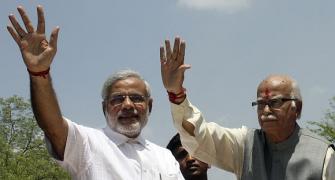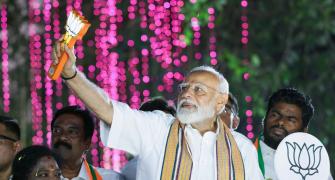The success of Gujarat has today put it in a place where it can negotiate and navigate international relations of direct economic consequence to it without being held back by the timidity in New Delhi, says Shashi Shekhar.
'What chance India has in the race with China?' asked the New York Times on April 24. That question could very well have been posed this decade, this century. It may surprise the reader to learn that the question is almost 130 years old.
In an opinion piece in the NYT reproduced from the London Daily News the question was posed on how India could be competitive with China with its high prices while observing why the Indian product commanded a price premium. The reasons cited of trade war between India and China in the 19th century could very well have been said of the 21st century.
Observing that the Chinese product had a low switching cost, the piece went on to explain the price premium enjoyed by India over China on account of purity and lack of adulteration in the Indian product.
As Gujarat Chief Minister Narendra Modi leads a 20-member business delegation to China predictably much of the focus in India has been on trivial minutiae. Loose talk, drawing phony parallels between the events of 2002 and Tiananmen Square apart hardly any of the focus has been on the substance of his visit including on the composition of the business delegation that is accompanying him.
The official statement however makes for interesting reading with its reference to the setting of benchmarks for the relations between China and Gujarat in the areas of infrastructure, economic and industrial development.
One hundred and thirty years back the debate on competitiveness between China and India did not end with just price and quality. The NYT piece also went on to highlight what may appear to be a role reversal with reference to the present day context between China and India.
The product in question back then was tea which was still being hand produced in China while India had already taken to industrialized manufacturing. Explaining the industrial advantage enjoyed by India, the piece explained how mechanised manufacturing employed by India through 20 HP steam engines, working rollers, driers etc made for more predictable and economical production.
The closing sentence of that piece from 1882 is particularly poignant in a contemporary sense as it goes on to speculate that if India were to ever have a chance to compete with China it would be mainly due to its use of machinery in manufacturing and not its labour.
One hundred and thirty years back when Indian manufacturing prowess in tea gave it a competitive edge against China it was the east coast that was the hub of economic activity with Calcutta being the gateway of tea exports. One hundred and thirty years later the story of India's competitiveness against China has taken a westward turn as the many industrial hubs and ports of Gujarat have left Kolkata and its past glory far behind.
The shift in Indian competitiveness from Bengal to Gujarat couldn't have been explained any better than this statistic quoted by Rajiv Shah of the Times News Network on November 6. Citing data from the National Sample Survey and the Gujarat state labour commisionerate, Shah reveals how Gujarat is the polar opposite of Bengal with its track record of a 300 percent decrease in cases of industrial unrest over the past decade.
Going from 224,132 man-days lost because of strikes in 2001 and lockouts in 53 establishments in the same year, Gujarat by 2010 had a mere 41,128 man-days lost and 18 strikes and lockouts. As Modi sets out on his visit to China it would be interesting to see what shape the transactions take between Gujarat's competitiveness and China's formidable manufacturing prowess.
Irrespective of tangible gains in trade and investment are made by Gujarat during this visit to China, there is a diplomatic message in this engagement with the Chinese leadership. The visit coming at a time when America's global influence is presumed to be on the wane is a message to the foreign policy establishment in the United States.
While professing to practice realism in its approach to international relations the US has been overly moralistic in its attitude towards Modi, perhaps at the cost of its own future interests in India. By allowing itself to be lobbied by fringe groups in the United States, the foreign policy establishment has forsaken an opportunity that China has cleverly tapped into.
There is also a message to domestic politics back home in India from this Modi expedition to China. 'Acceptability' follows 'permanent interests' as is evident from the shift in China's political engagement with India over the decades. As the Communist parties find themselves out of power in Bengal for the first time in many decades, a new economic reality is bringing their one time mentor China closer to their arch political and ideological rival.
The sobering reality however is that 130 years on China clearly holds the manufacturing edge over India. It would take immense creativity to craft a win-win proposition between Gujarat's relative competitiveness and China's price advantage. With a leadership succession to come next year within China, it would also take institutionalising this engagement to sustain its impact beyond the current regime.
It however is undeniable that the success of Gujarat has today put it in a place where it can negotiate and navigate international relations of direct economic consequence to it without being held back by the timidity in New Delhi.
Shashi Shekhar is a social media commentator on Indian politics and public policy. His blog can be found at http://blog.offstumped.in






